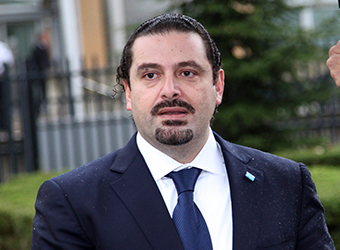Twelve days after the unexpected resignation of Lebanese prime minister Sa’ad Hariri, there are rumours doing the rounds in Beirut about two possible replacements. One is Abdul Rahim Murad, an all-time favourite of the Iran-backed March 8 Alliance, while another is Fouad Al Makhzoumi, an independent more acceptable to Saudi Arabia but on very good terms as well with the Iranians and Hezbollah.
Neither of them was available for comment when contacted, but both have been unusually active over the past week, making on-camera courtesy visits to ranking politicians from both sides of the political spectrum.
On-the-record, however, neither of them has laid claim to the top government post left vacant by Hariri’s resignation, insisting that they are “committed” to his return.
On November 5, Murad visited Damascus for talks with President Bashar Al Assad. The next day, he called on former Lebanese prime minister Najib Mikati saying: “We discussed the present state of affairs within the Sunni community and the importance of standing together and showing solidarity. We also discussed what needs to be done to reach a compromise and safeguard the nation’s independence.” Murad called for a broad meeting of Sunni politicians and notables. He was then asked bluntly about what his allies have been peddling behind closed doors — that he is wants to be the next prime minister of Lebanon. Murad however declined to comment, saying: “The present conditions prevent me from saying anything about this matter.”
On November 11, he visited his ally and friend, Parliament Speaker Nabih Berri, a powerful Shiite politician who had nominated Murad for the premiership back in 2005. At the time his candidacy was debunked by the Hariri-led March 14 Alliance. But the Hariri bloc, which along with its allies controls 46 seats in Parliament would undoubtedly bloc Murad’s candidacy. What would make or break him is the tipping vote of the parliamentary bloc that is headed by President Michel Aoun.
Unlike other figures in the March 8 Alliance, Murad is not critical of Saudi Arabia. Born in 1942, he studied business administration and law at the Beirut Arab University, graduating in 1968. A ranking Arab nationalist, Nasserist, and millionaire, he worked as a businessman for years until he entered parliament for the first time in 1990. Between 1995-1998 he was minister of higher education under Rafik Hariri, and in 2000, became minister of education. Four years later, was appointed minister of defence in the last cabinet of Prime Minister Omar Karami. He has since established a reputation for himself as leader of the pan-Arabist/Nasserist movement in Lebanon and one of its chief proponents in the Arab world. Fifteen years ago, he established a university in the Bekka Valley, called the Lebanese International University (LIU) and presently serves as President of its Board of Trustees.
The second tycoon — more acceptable to the Saudis and different segments of Lebanese society is Fouad Al Makhzoumi, president of the National Dialogue Party. In addition to meeting Mikati and Grand Mufti Abdul Latif Daryan on November 6, he received a delegation from the International Crisis Group (ICG) at his home in Beirut and conferred with the UAE Ambassador to Lebanon Hamad Saeed Al Shamsi. It is an open secret within Lebanese political circles that Makhzoumi has had his eyes set on the premiership for years, considering himself a permanent candidate who is acceptable by all sides, including Iran, Saudi Arabia, and Syria. When asked about the latest developments, Makhzoumi said: “We are sorry for the resignation of Prime Minister Hariri and hope he returns as soon as possible because he is a partner in any decision taken.
“These are hard times for the Sunni community, and what is expected from us is a united front,” Makhzoumi added.
Makhzoumi hails from the old notable Sunni families of Beirut. Born in 1952, he studied chemical engineering at Michigan University and worked in Saudi Arabia during the oil boom years, where he made a fortune, making him one of Lebanon’s wealthiest notables. He founded a company called Future Pipe Industries, chairing it from 1986 to 2003. His wife has been involved with donations to Conservative Party politicians in the UK, reaching up to £1 million (Dh4.84 million), and according to The Guardian, former French presidential hopeful François Fillon was paid up to $50,000 to arrange for a meeting between Makhzoumi and Russian President Vladimir Putin. Unlike Murad, who is very well-connected to Hezbollah, Tehran, and the Syrians, Makhzoumi is only on good terms with Hezbollah; he is a stranger in Damascus and Tehran.
For any ambition to come to pass, it would need the formal acceptance of Hariri’s resignation, something that Aoun has until now refused to sign off on, waiting for the ex-Premier’s return to Beirut for face-to-face talks.


